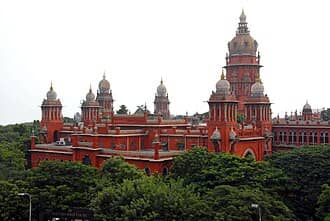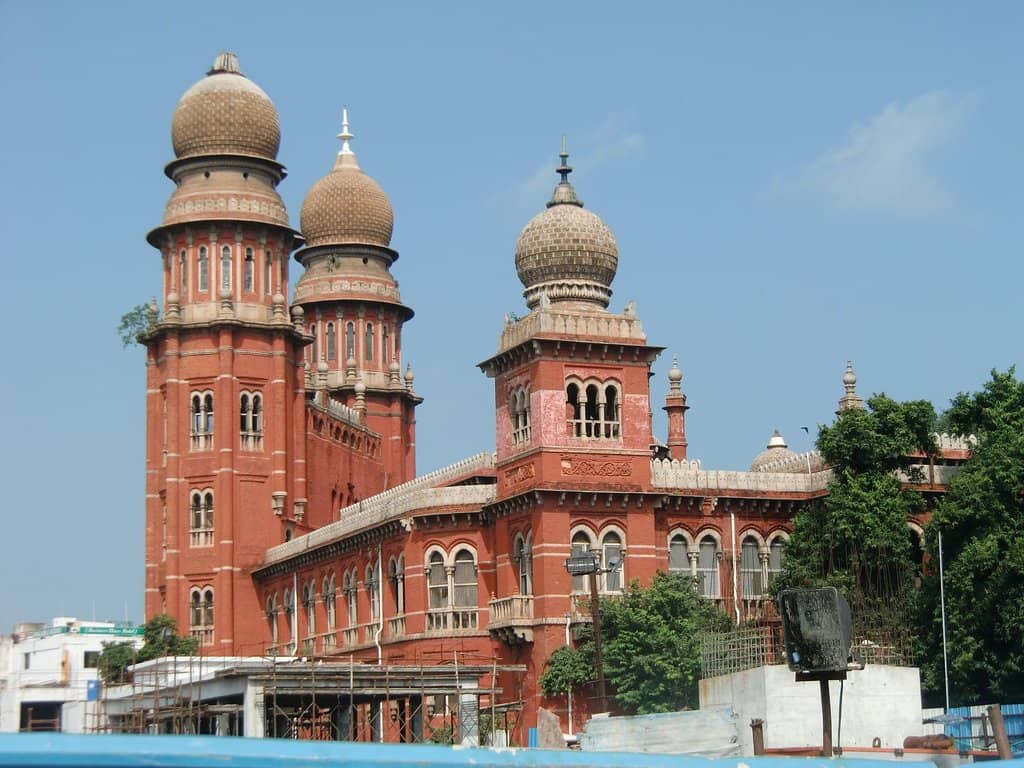
Madras High Court
A majestic Indo-Saracenic architectural marvel, the Madras High Court is a historic seat of justice and a significant landmark in Chennai.

Highlights
Must-see attractions

Social
From TikTok & Reddit
Best Time
Fewer crowds, more serene

Madras High Court
Best Time
Fewer crowds, more serene

Highlights
Must-see attractions
A majestic Indo-Saracenic architectural marvel, the Madras High Court is a historic seat of justice and a significant landmark in Chennai.
"Step into history at the Madras High Court, a stunning blend of architecture and justice."

Security First! :shield:
Expect thorough security checks. Keep bags light and be patient.
Museum Access :door:
The museum is free but requires coordination with security. Ask at the entrance.

Highlights
Discover the most iconic attractions and experiences

Indo-Saracenic Architecture
Main Building
Marvel at the majestic Indo-Saracenic design, a fusion of Indian and Islamic styles, showcasing intricate details and grandeur.
The Museum
Within the Court Complex
Explore the history of the court and legal heritage in this often-overlooked, free-to-enter museum.
Historic Lighthouses
Court Complex Rooftops
Discover two old lighthouses, remnants of its maritime past, offering a unique perspective on the complex.
Plans like a pro.
Thinks like you
Planning Your Visit
Navigating the Grandeur
Understanding its Significance
Best Times
Insider Tips
from TikTok, Instagram & Reddit
Security First! :shield:
Expect thorough security checks. Keep bags light and be patient.
Museum Access :door:
The museum is free but requires coordination with security. Ask at the entrance.
Dress Code :suit:
It's a working court. Dress respectfully, like the lawyers you'll see.
Architectural Gem :camera:
Capture the stunning Indo-Saracenic architecture. Best light is often in the morning.
Tips
from all over the internet
Security First! :shield:
Expect thorough security checks. Keep bags light and be patient.
Museum Access :door:
The museum is free but requires coordination with security. Ask at the entrance.
Dress Code :suit:
It's a working court. Dress respectfully, like the lawyers you'll see.
Architectural Gem :camera:
Capture the stunning Indo-Saracenic architecture. Best light is often in the morning.
Canteen Delights :fork_and_knife:
Try the local fare at the High Court canteen for an authentic experience.
What Travellers Say
Reviews Summary
Visitors are consistently impressed by the Madras High Court's magnificent Indo-Saracenic architecture and its historical significance as one of India's oldest high courts. The campus offers a glimpse into legal heritage, with many appreciating the free museum and the unique sight of legal professionals. However, some reviews mention the need for better maintenance and strict security checks.
"Madras High Court at Chennai:
The High Court of Judicature at Madras is a High Court located in Chennai, India. It has appellate jurisdiction over the state of Tamil Nadu and the union territory of Puducherry. It is one of the oldest high courts of India along with Calcutta High Court in Kolkata and Bombay High Court in Mumbai. The Madras High Court is one of four charter high courts of colonial India established in the four Presidency Towns of Madras, Bombay, Allahabad and Calcutta by letters patent granted by Queen Victoria, dated 26 June 1862. It exercises original jurisdiction over the city of Chennai, as well as extraordinary original jurisdiction, civil and criminal, under the letters patent and special original jurisdiction for the issue of writs under the Constitution of India. Covering 107 acres, the court complex is one of the largest in the world, second only to the Supreme Court of the United Kingdom. The four-storey administrative building serves hundreds of litigants every day.
History:
Tree-lined squares and red-brick buildings have witnessed many important moments in Indian legal history. Yet, the 127-year-old Madras High Court complex remains a relatively unexplored part of the city. Designed by JW Brassington, then consulting architect to the Government, its grand Indo-Saracenic structure was completed by Henry Irwin in 1892. Home to two of the city’s early lighthouses, one a Doric column of Pallavaram granite, the other atop a dome on the main building fuelled by kerosene and visible 32 miles out at sea, the complex’s turreted magnificence was what many first saw of Madras when they came in by masula boats from the bay."
Raghunandan Ramachandran
"The main building was under maintenance, so I couldn’t visit it, but I explored the museum instead.
Museum entrance is free, but it needs to be coordinated with security. Ask for information at the entrance and they'll let you in."
Mojgan Hashemian
"In my lifetime i saw first time inperson Indo Saracenic Architecture . . This high court is superbly constructed. The steps are so very beautiful. I love it 😍😍😍😍😍 Need some proper maintainence."
IMRAN K
What People Like
What People Dislike
Frequently Asked Questions
🚇 🗺️ Getting There
The Madras High Court is centrally located in Chennai. You can reach it via local buses, auto-rickshaws, or ride-sharing apps. It's accessible from major city points, and many locals refer to it as the 'Chennai High Court'.
Parking can be challenging due to the court's location and security. It's advisable to use public transport or drop-off services if possible.
The complex is large, so comfortable walking shoes are recommended. You'll see many lawyers and staff navigating the grounds.
Yes, the Madras High Court offers e-court services for case status and other information. You can find details on the official Madras High Court website.
Yes, it's well-connected by public transport. Many bus routes pass through or near the High Court in Chennai.
🎫 🎫 Tickets & Entry
Entry to the general campus is usually free, but you will undergo security checks. Access to specific areas or the museum might require coordination.
As it's a functioning court, visiting hours are generally during business hours on weekdays. The museum's hours may vary, so it's best to inquire upon arrival.
Yes, it's a place of law, so visitors are expected to dress modestly and respectfully. Avoid shorts, sleeveless tops, and overly casual attire.
Photography rules can be strict. While exterior shots are generally allowed, it's best to check for signage or ask permission before taking photos inside buildings or sensitive areas.
To appreciate the architecture and potentially visit the museum, allocate at least 1-2 hours. If you're interested in observing court proceedings, plan for longer.
🎫 🏛️ Onsite Experience
The Madras High Court is a prime example of Indo-Saracenic architecture, a beautiful blend of Indian, Islamic, and Gothic styles, designed by JW Brassington and completed by Henry Irwin.
Yes, there is a museum within the Madras High Court complex that showcases its rich history and legal heritage. Entry is typically free but may require prior arrangement with security.
It's one of the oldest high courts in India, established in 1862, and has played a pivotal role in Indian legal history. It has jurisdiction over Tamil Nadu and Puducherry.
Besides the main building, the campus features historic lighthouses and vast grounds that reflect its colonial past and architectural significance.
In some cases, public galleries are available for observing court proceedings. However, this is subject to the court's discretion and specific case rules.
🍽️ 🍽️ Food & Dining
Yes, there's a canteen within the Madras High Court campus that serves food. It's a popular spot for lawyers and staff, offering a local dining experience.
The canteen typically offers South Indian cuisine, including local snacks and meals, providing an authentic taste of Chennai.
The High Court is located in a busy part of Chennai, so numerous restaurants and eateries are available in the surrounding areas, catering to various tastes and budgets.
📸 📸 Photography
The exterior of the Indo-Saracenic building, the grand staircases, and the courtyards offer excellent photographic opportunities. Capture the intricate details of the architecture.
Photography inside courtrooms and sensitive areas is usually prohibited. Always check for signage or ask for permission before taking pictures.
Morning light often provides a softer, more flattering illumination for the building's facade. Late afternoon can also offer beautiful golden hour shots.
Drone usage is strictly prohibited in and around government buildings and sensitive areas like the High Court due to security regulations.
For Different Travelers
Tailored advice for your travel style
👨👩👧 Families with Kids
Consider focusing on the visual aspects – the impressive Indo-Saracenic design and the unique lighthouses. It can be a good opportunity to teach children about important institutions and historical buildings in a tangible way. However, be mindful of security checks and potential restrictions on photography.
🏛️ History Buffs & Architecture Enthusiasts
Don't miss the museum within the complex, which offers a deeper dive into the court's legacy. Understanding the context of its construction and its role in shaping legal history will enrich your visit. Allow ample time to soak in the atmosphere and appreciate the craftsmanship.
⚖️ Law Students & Aspiring Lawyers
Pay attention to the courtroom dynamics, the arguments presented, and the overall decorum. The campus itself serves as a living testament to legal education and practice. Exploring the museum can also provide historical context for your studies.
Deep Dives
In-depth insights and expert knowledge
A Glimpse into History and Architecture
Beyond its legal function, the complex holds historical significance. It once housed two lighthouses, one a Doric column and another atop the main building's dome, which guided ships into the Madras harbor. The sheer scale of the court complex, covering 107 acres, makes it one of the largest in the world, second only to the Supreme Court of the United Kingdom. Visitors often remark on the impressive steps and the overall grandeur of the site, though some note the need for better maintenance.
For those interested in a deeper dive, the museum within the court complex offers a free glimpse into the institution's past. While access might require coordinating with security, it's a valuable addition for understanding the legal and architectural heritage. The experience of walking through these halls can feel like stepping back in time, with echoes of justice and history resonating through the corridors.
The Life of a Lawyer at Madras High Court
For aspiring lawyers and students, the Madras High Court represents a significant milestone. It's a place where legal careers are forged, and justice is pursued. The reels often showcase the dedication and passion of these legal minds, highlighting the challenges and rewards of their profession. The court campus also offers practical insights, with its own canteen providing a taste of local life and a place for informal discussions among legal fraternity members.
Navigating the court complex can be an experience in itself, with its vastness and the constant flow of people. Visitors might feel a sense of awe amidst the legal professionals, as captured in some posts that describe feeling lost in the crowd of advocates. The atmosphere is one of serious legal work, but also of community and shared purpose.






Social
from TikTok, Instagram & Reddit